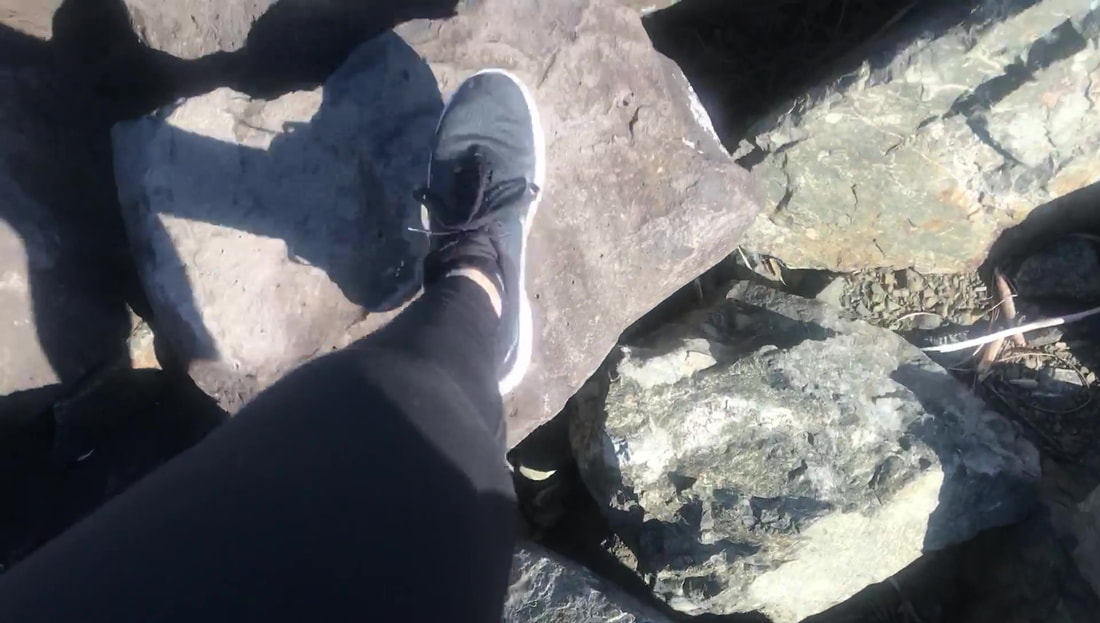|
When we are working on balance in the clinic we are always trying to get someone to challenge their balance to make change.
In fact we know that to really improve your balance fast you need to be off balance about 50% of the time. When we are working on balance the aim for us is not to always make you still. We often are trying to get you practising recovering your balance or integrating your sensors to makes sure all the systems are working well together. Here Belinda describes how she has been challenging her balance. "Decided to mix up my daily walk a few days ago (in sunnier times) and challenge my brain and body to do something more novel and out of my normal comfort zone. It’s amazing how many systems were at play to help me negotiate these rocks safely. Our brains are remarkable, integrating all the information and sensory inputs in order to give an efficient and appropriate output = BALANCE .... vestibular, vision, depth perception, balance reactions, postural adjustments, proprioception, motor control, coordination, planning, concentration... just to name a few. Some conscious and many subconsciously working I was definitely loosing my balance 50% of the time which was putting me in an ideal training zone for balance retraining. The best part was that this was fun. If you want to have better balance you need to train all the systems. Train the inputs to improve the output. When ever we train balance however we do weigh up safety and confidence. But remember no challenge no change. When talking about Vestibular rehab (the fancy name for retraining balance and reducing dizziness and vertigo caused by the inner ear and related systems).
We loosely break it down into two broad categories – Peripheral (coming from the inner ear itself) or Central (coming from the brain or neurological pathways) Examples of Peripheral conditions are:
Symptoms can be very similar between central and peripheral conditions and it is not uncommon to see some present with more than one vestibular issue. For example traumatic BPPV post concussion or BPPV with Parkinson's, Migraine triggered by BPPV. This is why a full assessment is important to see where symptoms are stemming from and treat them appropriately A Physiotherapist trained in Vestibular rehab has the skills and knowledge to be able to distinguish between the two categories in testing and there are treatments for both central and peripheral conditions and then treat these effectively with positional manoeuvres, gaze stability and balance exercises to provide a well rounded program for recovery. Having dizziness and balance issues checked are important as they can be treated effectively and leaving them untreated increases a persons falls risk, not to mention reduced participation in the activities they enjoy doing because of ongoing symptoms and avoidance due to fear of causing their symptoms. Don't let dizziness hold you back, get it looked at today.
|
�
Categories
All
Archives
July 2023
|
||||||||
|
Contact Us
Give us a call or send us an email to find out how we can help you on your rehab journey Phone 09 424 3254 [email protected] Visit us 3/55 Karepiro Drive, Stanmore Bay, Whangaparaoa |
Cancellation Policy:
Out of courtesy to your therapist, and other clients who may be waiting for an appointment, please inform us of cancellations as soon as possible.
Cancellations Charges: Short notice cancellations within 48 hours of your appointment or reschedules will incur a late cancellation fee of 60%.
For block bookings, one session will be deducted for three cancelled appointments.
Please be aware that ACC does not cover all cancelled appointments.
How to Cancel Your Appointment
If you need to cancel your appointment, please call us at 09 424 3254 between the hours of 8am – 5pm. If necessary, you may leave a detailed voicemail message. We will return your call as soon as possible.
Late Cancellations/No-Shows
A cancellation is considered late when the appointment is cancelled less than 48 hours before the appointed time. A no-show is when a patient misses an appointment without cancelling. In either case, we will charge the patient a 60% missed appointment fee.
Out of courtesy to your therapist, and other clients who may be waiting for an appointment, please inform us of cancellations as soon as possible.
Cancellations Charges: Short notice cancellations within 48 hours of your appointment or reschedules will incur a late cancellation fee of 60%.
For block bookings, one session will be deducted for three cancelled appointments.
Please be aware that ACC does not cover all cancelled appointments.
How to Cancel Your Appointment
If you need to cancel your appointment, please call us at 09 424 3254 between the hours of 8am – 5pm. If necessary, you may leave a detailed voicemail message. We will return your call as soon as possible.
Late Cancellations/No-Shows
A cancellation is considered late when the appointment is cancelled less than 48 hours before the appointed time. A no-show is when a patient misses an appointment without cancelling. In either case, we will charge the patient a 60% missed appointment fee.



 RSS Feed
RSS Feed
